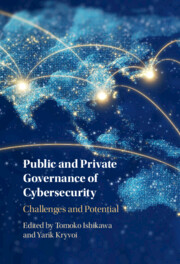Book contents
- Public and Private Governance of Cybersecurity
- Public and Private Governance of Cybersecurity
- Copyright page
- Contents
- Contributors
- Acknowledgements
- Abbreviations
- 1 Introduction
- 2 International Relations Perspectives
- 3 The State-Oriented Model of Internet Regulation
- 4 Cybercrime, the United Nations, Prospects, and Challenges for International Co-operation
- 5 Responding to Public and Private Cyberattacks
- 6 International Data Transfers and Cybersecurity
- 7 International Trade Law and Cybersecurity
- 8 Cyberthreats, Human Rights, and FDI Restrictions
- 9 Public–Private Partnerships on Cybersecurity and International Law
- 10 The Geopolitical Divide, Norm Conflict, and Public–Private Partnership in Cybersecurity Governance
- Index
8 - Cyberthreats, Human Rights, and FDI Restrictions
Published online by Cambridge University Press: 09 November 2023
- Public and Private Governance of Cybersecurity
- Public and Private Governance of Cybersecurity
- Copyright page
- Contents
- Contributors
- Acknowledgements
- Abbreviations
- 1 Introduction
- 2 International Relations Perspectives
- 3 The State-Oriented Model of Internet Regulation
- 4 Cybercrime, the United Nations, Prospects, and Challenges for International Co-operation
- 5 Responding to Public and Private Cyberattacks
- 6 International Data Transfers and Cybersecurity
- 7 International Trade Law and Cybersecurity
- 8 Cyberthreats, Human Rights, and FDI Restrictions
- 9 Public–Private Partnerships on Cybersecurity and International Law
- 10 The Geopolitical Divide, Norm Conflict, and Public–Private Partnership in Cybersecurity Governance
- Index
Summary
The chapter discusses cybersecurity from the perspective of human rights protection. It first identifies adopting border measures as one approach to fulfilling a state’s duty to protect its citizens against human rights violations caused by cybercrimes. It then examines the tension between these FDI restrictive border measures and states’ investment protection and promotion obligations under IIAs. The analysis demonstrates a limitation in the current international law framework in which invoking the concept of national security remains the only means for states to address cyberthreats, which involves the risk of an accelerating shift to protectionism.
Keywords
- Type
- Chapter
- Information
- Public and Private Governance of CybersecurityChallenges and Potential, pp. 185 - 210Publisher: Cambridge University PressPrint publication year: 2023

